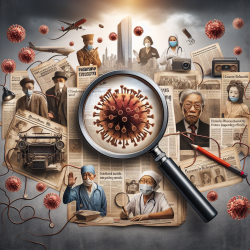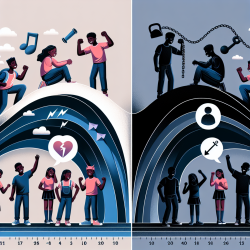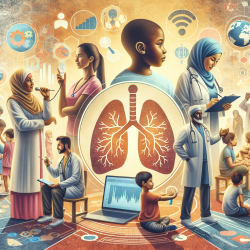The 2003 SARS epidemic offers a profound case study on the intersection of public health, media influence, and cultural stigmatization. The research article titled "SARS and New York's Chinatown: The politics of risk and blame during an epidemic of fear" by Laura Eichelberger provides valuable insights into how risk perceptions are formed and manipulated during health crises. This blog post will explore how practitioners can utilize these insights to improve their skills and encourage further research into the social dynamics of epidemics.
The Role of Media in Shaping Risk Perceptions
The media plays a pivotal role in shaping public perceptions during health crises. During the SARS outbreak, media coverage often sensationalized the threat, leading to widespread fear and stigmatization of Asian communities, particularly in New York's Chinatown. Practitioners should be aware of the media's potential to amplify fear and perpetuate stereotypes. By critically engaging with media narratives, practitioners can better understand the societal impact of health crises and work towards more balanced reporting.
Stigmatization and Its Consequences
The research highlights how historical stigmatization of Chinese-Americans resurfaced during the SARS epidemic. Despite no cases of SARS in Chinatown, the community was quickly labeled as a site of contagion. This stigmatization led to significant economic losses and heightened anxiety within the community. Practitioners must recognize the long-lasting effects of stigma on marginalized communities and work to address these issues through culturally sensitive public health strategies.
Encouraging Further Research
The study underscores the importance of understanding the historical, political, and economic factors that shape responses to epidemics. Practitioners are encouraged to delve deeper into these areas to develop more effective interventions that consider the broader social context. Further research can also explore how othering within communities contributes to health disparities and identify strategies to combat these issues.
Implementing Research Outcomes
- Cultural Competency Training: Practitioners should undergo training to better understand cultural nuances and avoid perpetuating stereotypes during health crises.
- Community Engagement: Building trust within communities before a crisis occurs can help mitigate fear and misinformation.
- Media Collaboration: Working with media outlets to promote accurate reporting can help reduce stigma and improve public understanding.
The lessons learned from the SARS epidemic in New York's Chinatown are invaluable for practitioners seeking to enhance their skills in managing public health crises. By understanding the complex interplay between media narratives, cultural stigma, and community responses, practitioners can develop more effective strategies for future epidemics.
To read the original research paper, please follow this link: SARS and New York's Chinatown: The politics of risk and blame during an epidemic of fear.










